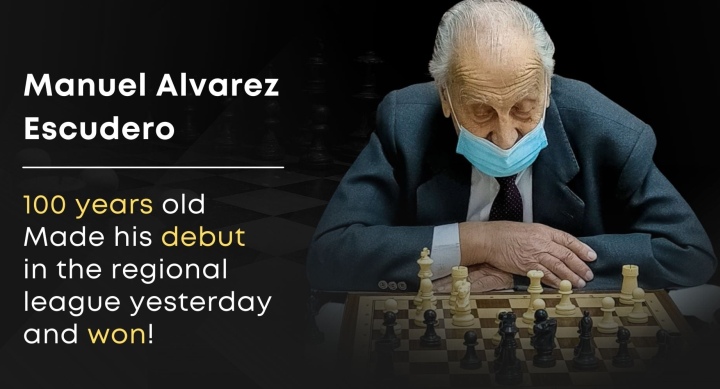During the past months, we have brought to our social media channels the story of Manuel Alvarez Escudero, from Madrid. Born in 1921, Manuel is still very much an active player who, at 100 years and six months old, is rated 1627. He just took part in this season’s regional league with his club, where, despite starting off with a victory, he ended up losing a few rating points. To put things in perspective, Manuel was born in the year Jose Raul Capablanca became World Champion, and his life encompasses the greater part of modern chess history.
Manuel also recently got some airtime in the Spanish media, which presented him as an example of active ageing. We all could name some other examples of chess personalities who demonstrated remarkable intellectual longevity. The beneficial effect of chess in delaying brain ageing and cognitive impairment (and therefore, Alzheimer and other types of dementia) is supported by relevant scientific studies and statistics.

With all this in mind, a group of entrepreneurs and chess promoters from Spain have recently developed a chess-based cognitive training program in the form of a mobile application that they named Gymchess. The founders of this interesting project are Leontxo Garcia, chess journalist and science communicator, Juan Antonio Montero, psychologist and a world-class authority on the topic of therapeutic applications of chess and Asier Rufino, CEO of Tecnalia Ventures, Chairman and Board member in several deep-tech spin-offs, as well as a Professor at the prestigious Deusto Business School.
The chess-based cognitive training program is based on the amp experience gathered by Juan Antonio Montero in multiple face-to-face workshops with more than 3,500 users over the last ten years with the support of the regional government of the Extremadura region in Spain. This allowed him to develop a methodology (ECAM) that has been applied to create Gymchess, with the ultimate goal of improving the cognitive system and slowing down the effects of brain ageing, serving as a complement to people conscious of their personal well-being and mental health. Users don’t need to have any prior chess knowledge or even know how the chess pieces move to start using and benefiting from the app.
The Gymchess app was presented in the Spanish Pavilion at Expo Dubai last December, during the World Championship Match, with the presence, among others, of its founders and Teresa Riesgo, Secretary-General of Innovation at the Ministry of Science and Innovation of the Government of Spain. The technological start-up is supported by the Basque Government and the Provincial Council of Gipuzkoa.
If you are aware of any similar initiative involving chess for seniors and active ageing, please contact FIDE’s Social Commission at socialchess@fide.com.







